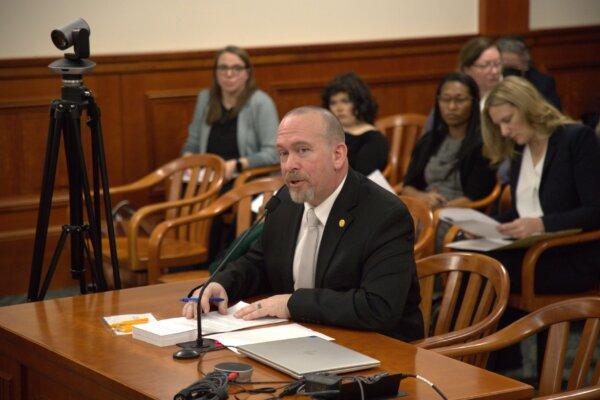Michigan House Requires Cities and Universities to Comply with ICE to Access Funding
A recently enacted rule stipulates that no appropriations bill will be voted on if it allocates funds to a city or university that defies federal immigration laws.
An amendment to an appropriations rule has been approved, imposing financial penalties on any municipality or university in Michigan that does not adhere to federal immigration legislation or undermines its enforcement.
The updated rule requires that no appropriations bill will be brought forth for a vote if it includes a “legislatively directed spending item”—commonly referred to as earmarks or pork barrel spending—for any municipality or university that “actively maintains any rule, policy, ordinance, or resolution designed to undermine immigration enforcement or that does not comply with federal immigration enforcement measures.”
Majority Whip Mike Harris informed The Epoch Times that localities and universities reach out annually to the Legislature for funding to support various projects.
With the new rule in place, these appropriations will be disregarded by the Michigan House if the recipients do not collaborate with U.S. Immigration and Customs Enforcement (ICE).
The Partisan Divide
House Democrats are vehemently against HR 19, expressing on their website: “This resolution, on the surface, compels local governments to report and verify their policies and adherence to federal immigration laws as a precondition for receiving state funds.
“Nevertheless, this policy could jeopardize public safety, damage community trust, and jeopardize funding for local governments.”
According to Harris, Republican lawmakers view the resolution as a means to “counteract the detrimental policies of the Democrats, restore common sense in our state, and serve as an example for the rest of the nation.”
Harris noted that instead of attempting to enact this policy via legislation, which would likely face certain defeat in the Democrat-led state Senate, the House decided to implement it through its own rules.
“The critical factor is our divided government,” Harris remarked. “At least these rules allow us to manage what occurs within our own chamber.”
He stated that the resolution will influence the budget process and control what is presented to the House floor for a vote, thus affecting what gets forwarded to the Senate.
“I believe this approach is a great model for the country,” he stated.
Specific Requirements
The resolution mandates that municipalities and universities disclose their rules, policies, ordinances, and resolutions pertaining to federal immigration law and enforcement to the House.

State Rep. Mike Harris testifies before a House committee. Courtesy of Mike Harris
According to the resolution, they are required to declare in writing whether they plan “to collaborate with federal authorities or actively harbor or shield illegal immigrants from federal enforcement actions.”
To have their requests for special project funding evaluated, local officials must certify that their documents do not include any language that “requires, encourages, or supports actions that subvert immigration enforcement in any manner.”
Additionally, municipalities and universities must commit in writing to “adhere to federal immigration law.”
A View From the Ground
Harris brings a background in law enforcement spanning 26 years prior to his legislative duties.
He informed The Epoch Times that “illegal entry into our country is a criminal act.”
“Individuals who engage in such acts have shown their disregard for our laws. Many of them have prior criminal records,” he noted.
“Transnational criminal organizations have infiltrated my district in Oakland County, committing burglaries. They are highly organized and often target the homes of professional athletes, particularly for memorabilia.
“Every time local law enforcement dismantles one gang, another swiftly takes its place. They are coming from places like Chile and Venezuela.
“I have firsthand experience in understanding the importance of strong cooperation between local and federal law enforcement, highlighting the need for our communities and universities to stop obstructing their efforts.”
Counties such as Kalamazoo, Kent, Leelanau, Luce, Muskegon, Oakland, Washtenaw, Wayne, and Wexford fall into this category.
Detroit positions itself as a “Welcoming City,” while the state capital of Lansing identifies itself as a sanctuary city.
Michigan is not classified as a sanctuary state.




